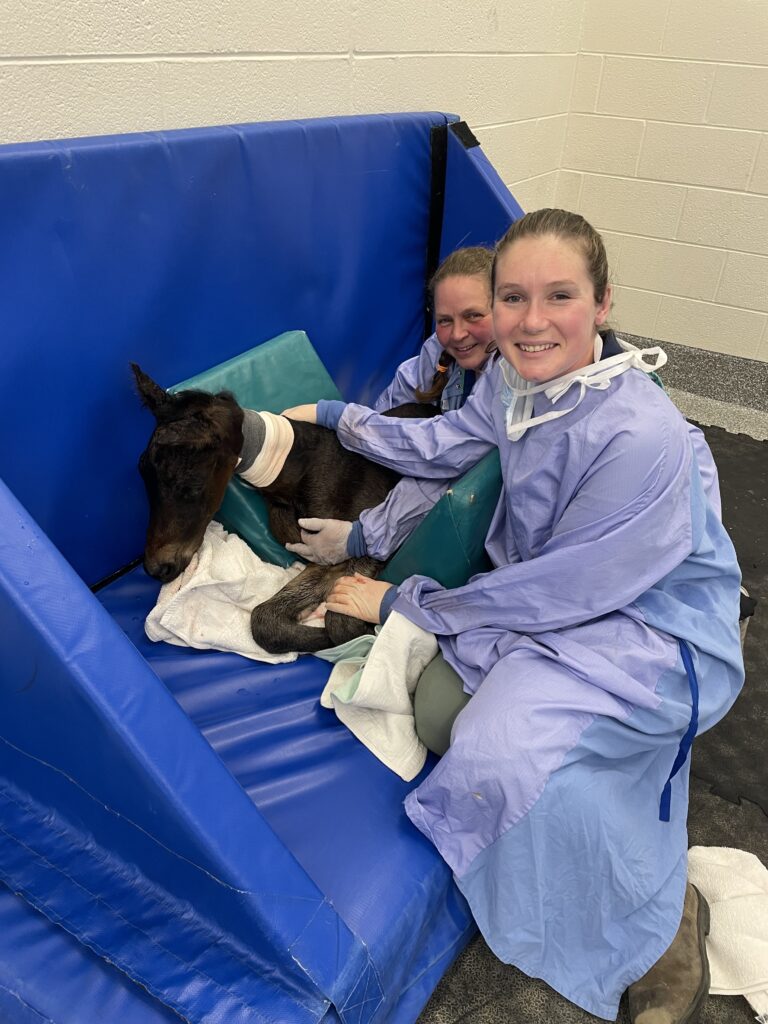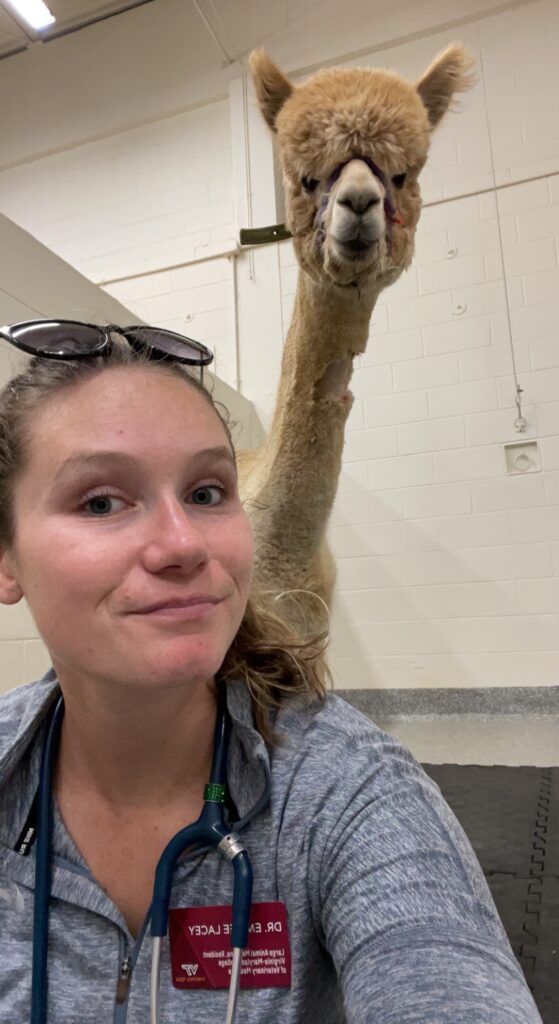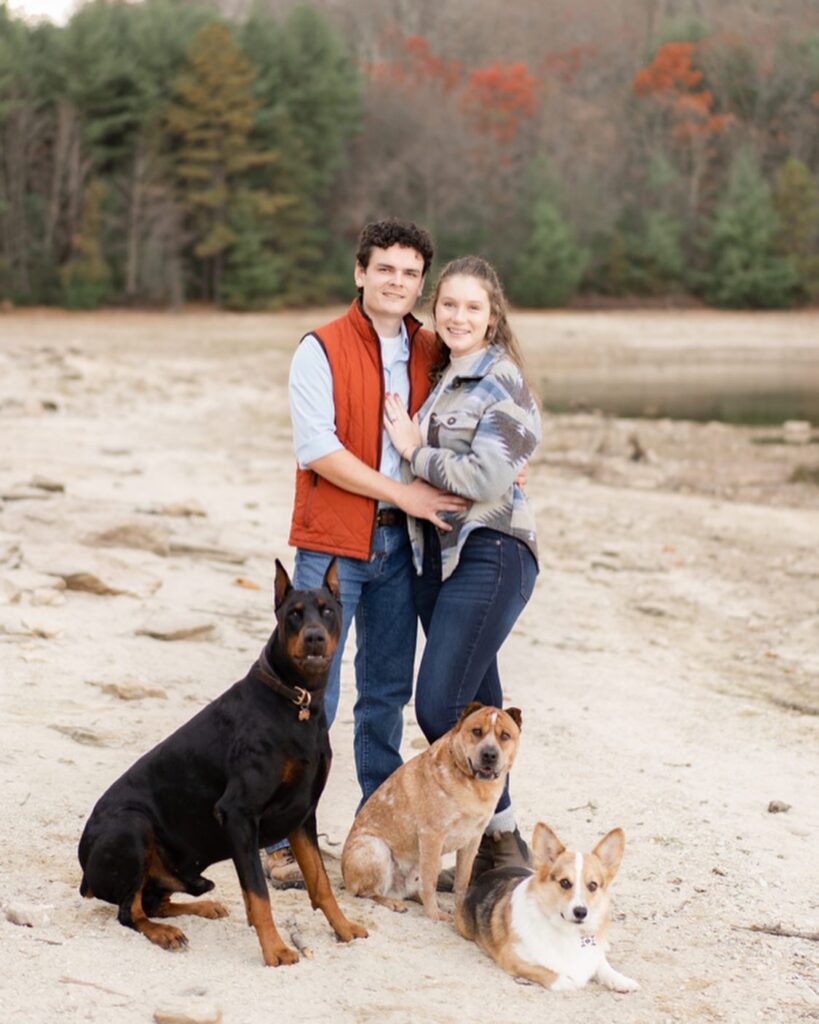
Photo courtesy of Dr. Emilee Lacey
Learn More About Dr. Emilee Lacey, Palm Beach Equine Clinic’s New Internal Medicine Specialist
Dr. Emilee Lacey grew up in California, graduated from the University of Pennsylvania in 2021, and completed an internship at Sports Medicine Associates of Chester County in Cochranville, PA. She has been immersed in the sport horse world her entire life, but her passion for managing fevers, respiratory disorders, and neurologic disease led her away from lameness exams and toward internal medicine. Dr. Lacey completed her large animal internal medicine residency and obtained a Master’s of Science in Biomedical and Veterinary Sciences at Virginia Tech in Blacksburg, VA, this summer. She joined Palm Beach Equine Clinic in August 2025.
What first sparked your love of horses?
My love for horses started at a very young age, but it was really nurtured by my horse-loving grandmother, aunt, and mom. After what felt like years of begging, my mom finally put me in horseback riding lessons when I was in grade school. After about a year of consistent riding, I convinced my mom to let us buy my aunt’s horse, Chili, an off-the-track Thoroughbred (OTTB) that was barely restarted and literally lived across the country in Maryland. She came off the trailer in California like a typical green OTTB: head straight up in the air, nostrils flared, and breathing like a dragon. I was only seven years old at the time, and I thought this was the BEST DAY EVER. My trainer had very different thoughts. This mare not only taught me to ride; she also taught me valuable horsemanship skills I still utilize today. Many other horses have come after Chili, but this mare will always be the spark that truly ignited my love for horses.
What inspired you to become a large animal veterinarian?
I’ve known I wanted to be a veterinarian since I was three years old. I halfheartedly joke that the words “I want to be a vet” were actually my first coherent words. I spent my childhood years obsessed with every TV show or movie that even slightly mentioned veterinary medicine, earned every Girl Scout patch remotely related to veterinary medicine or animals, and volunteered as much time as I could in any clinic or with any equine veterinarian that would take me.
When I finally made it to veterinary school, I was convinced I had to be a small animal veterinarian to have time for my own horses. I was so wrong! During my studies at the University of Pennsylvania, I met many vets who had their own horses and hobbies while maintaining an excellent work-life balance. I also realized that not only was I more interested in large animal medicine, but I was also better at it because I could connect with the owners. I am a horse owner first, and a veterinarian second. I understand how these special animals can become a part of your family.
After veterinary school, I completed an internship with Sports Medicine Associates of Chester County in Pennsylvania. I developed a special interest in managing poor performance that is not related to lameness. Diseases like Equine Asthma, myofibrillar myopathy, gastric ulceration, chronic hepatopathy, and heart murmurs all pulled me away from lameness exams and toward internal medicine. After my internship, I was humbled and honored to complete a large animal internal medicine residency at the Virginia-Maryland College of Veterinary Medicine in Blacksburg, VA. This three-year-long opportunity was a lot of hard work, but I loved every minute. When you love what you do, it doesn’t feel like work. I truly have the best job in the world!

Photo courtesy of Dr. Emilee Lacey.
How did that path lead you to Palm Beach Equine Clinic?
I found my way to Palm Beach Equine Clinic through a few mutual patients while completing my residency in Internal Medicine at Virginia Tech. While caring for these patients in the hospital, I was collaborating with [PBEC Founder] Dr. Paul Wollenman almost daily for a few weeks. During this time, [PBEC President] Dr. Scott Swerdlin reached out to me to gauge my interest in a job opportunity with PBEC. I was so impressed with the communication and collaboration among the veterinarians at this hospital, but what really convinced me was their dedication to excellent patient care. At PBEC, care doesn’t stop when an animal is discharged. The veterinarians here will continue to check in on your horse long after they’ve returned to the barn, and there’s also a team of other veterinarians, technicians, and support staff ready to help you if needed.
What are your current responsibilities or areas of focus at PBEC?
My current area of focus at PBEC is equine internal medicine. This is a specialized branch of veterinary medicine that focuses on the diagnosing and treating diseases affecting internal organ systems, including the heart, lungs, gastrointestinal tract, kidneys, liver, endocrine system, central nervous system, and others. I primarily care for patients in the hospital that require intensive care, but I also dedicate time to recheck examinations and consultations in the field. I tell my friends and family that my job is similar to a human physician working in an intensive care unit in a hospital.
What does a typical day on the job look like for you?
A typical day starts with morning rounds with our associate veterinarians, surgeons, and intern veterinarians to review the status of our current inpatients and update their treatment plans. After rounds, I review any completed daily bloodwork and complete any pending diagnostics, like recheck ultrasound examinations or a gastroscopy, for the current inpatients. I might spend the afternoon at nearby farms completing recheck examinations on previous patients, consulting on new cases from other veterinarians, or conducting an outpatient appointment in the hospital. I am also available for incoming emergency admissions, which can happen quite frequently and without much notice! At the end of every day, I round again with our intern veterinarians, which ensures excellent patient care in a collaborative environment.
What do you enjoy most about being part of the PBEC team?
My favorite part of working at PBEC is the ability to collaborate openly with veterinarians of different specialties and backgrounds. A person simply cannot know everything, and there is always more than one right way to do something. It’s really special to be able to walk down a hallway and talk to three different surgeons about their experiences with a certain diagnosis!
What new technology or recent advancements in veterinary medicine do you find most exciting?
I am most excited about recent advancements in therapeutic options for the management of equine metabolic disease (EMS). EMS is a common endocrine disorder associated with a horse’s inability to regulate their insulin levels – similar to “pre-diabetes” in humans. Horses with EMS are at high risk of developing laminitis, which can be life threatening. Historically, EMS was only managed with dietary changes and the limited efficacy of a short list of medications.
Now with the current use of ertugliflozin, a medication belonging to a class of drugs called sodium-glucose cotransporter 2 (SGLT2) inhibitors, we have another option to reduce a horse’s insulin level in an attempt to prevent laminitis. Further studies are needed regarding long-term use, but we have seen some promising results over the last few years in clinical practice. As a horse owner who lost her heart horse to laminitis, it is really rewarding to help horses who suffer from this condition now.
What’s the most challenging part of being an equine veterinarian, and how do you handle it?
The most challenging part of being an equine veterinarian is convincing young, aspiring veterinarians to join our field! We are facing a national crisis due to the shortage of large animal veterinarians. More newly graduated veterinarians are entering small animal practice, there is an increased rate of early-career equine veterinarians leaving the profession, and a significant number of equine veterinarians are nearing retirement. One of my goals as an equine veterinarian is to show the younger generation that this is the best job in the world. I try to create a welcoming environment for learning by hosting externs and teaching interns every chance I can get. We need more horse vets!
What’s the most rewarding part about serving the equestrian community?
The most rewarding part of serving the equestrian community is having the opportunity to give back to the community that gave me so much growing up. I was so blessed to be surrounded by such thoughtful and caring horse trainers, owners, and veterinarians who cared for me like I was family. I was raised in the horse world, and it’s surreal and humbling to be able to care for these special animals during their most vulnerable times. I hope I never have to meet you and your horse in the hospital during an emergency, but if I do, I understand what it’s like to be the emotional owner! I’m here to care for your horse and support you in whatever decisions we need to make for them.
Is there a particular case or experience you’ve had at PBEC that has been especially meaningful to you?
My first few weeks at PBEC have been filled with some unusual cases, but one pony in particular has gained a special place in my heart. This pony was sick for a few days before being admitted to the hospital. Upon initial examination, I diagnosed an intra-abdominal mass. Through aggressive supportive care as well as anti-inflammatory and antibiotic medicines, this mass has decreased substantially in size, and the pony was able to go home. This pony went from being dull and not eating to being very difficult to catch and developing a voracious appetite. I recently received a video of him playing in a sprinkler at home. Success stories like this remind me of why I chose to pursue this career.
What advice would you share with those who dream of becoming equine veterinarians one day?
To those horse-crazy girls and boys thinking of being an equine veterinarian, don’t give up on your dream! Take every opportunity you can to be around horses, and network with any veterinarian you can. Be brave and introduce yourself – most of us love to chat about this job. If you find yourself in Florida, don’t hesitate to contact PBEC to set up an externship. We need you to join our profession!

Photo courtesy of Dr. Emilee Lacey.
When you’re not at work, what do you enjoy doing to relax and recharge?
When I’m not at work, you can catch me riding my horse, William, a 16-year-old OTTB gelding who has had me wrapped around his hoof since he was three years old. I have had this horse just a few months longer than I have known my husband, Mike. When I’m not at the barn, Mike and I enjoy walking our dogs on the beach, scuba diving, or simply enjoying a sunny afternoon at the pool with our family. It’s so important to have an identity outside of being a veterinarian, and I aim to be that example!